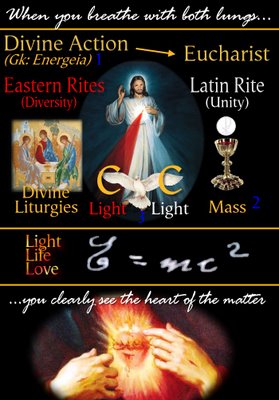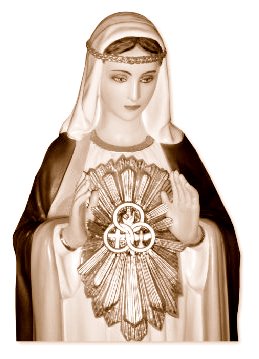Trinity Sunday Reflection II
The light and radiance of Angels, the allure of stained glass, nimbuses and haloes, sacred artwork, sacramentals and candles, Guardian angels prayers and statues, are signs of holiness and radiance; perhaps we neglect these and maybe this is why souls are "going new age." Like Scott Hahn says—we shouldn't be cowering in using terms like "light" and so forth, but re-claim them. The Church-visible should help spark the Light in souls by way of sacramentals.
(Fr. John Lombardi, http://www.veritaschristi.org/articles/misc/2005/stories_of_light.htm)
Breathing with Both Lungs...
A Gift from the Eastern Orthodox Church
Three Ways Upwards
The Fathers of our Holy Church suggest three ways to make progress in the spiritual life and attain spiritual perfection:
1. The way of catharsis or purification
2. The way of illumination, and
3. The way of perfection by total union with God.
These ways can bring the Christian who cooperates with divine grace to perfection. Synergy of the individual effort with the help of the grace of God brings us to our ultimate destiny of perfection. Our Lord's death and resurrection achieve for us our end in attaining the presence of the Holy Spirit within us.
The Philokalia speaks of "the increasing knowledge of God decreases knowledge of all else. In other words, the more a man knows God; he knows less of other matters. Not only this, but he begins to realize more and more clearly that neither does he know God." This point is of fundamental importance to Orthodoxy that declares the total mystery and unknowability of the divine essence.
The purpose of man is to achieve moral perfection through the acquisition of the Holy Spirit. In the teachings of Saint Seraphim of Sarov, the Holy Spirit leads the individual through the steps outlined above in order to attain union with the Spirit of Truth.
Monasteries are Spiritual Centers of Orthodox Spirituality
The spirituality of the Orthodox Church is best exemplified in its spiritual centers, the monasteries. The monk is a "martyr" or "witness" to Christ, the Son of the living God. Dostoyevsky's The Brothers Karamazov is an excellent example of this spiritual model in the person of Father Zossima. This monastic model eloquently portrays the spirituality of the Orthodox Church. Dostoyevsky distinguishes between worldly freedom and the spiritual person. He says that the worldly or secular people "maintain that the world is getting more and more united, more and more bound together in brotherly community, as it overcomes distance and sets thoughts flying through the air." But in reality the opposite is true, as is evident in international conflicts and wars. This famous Orthodox novelist expressed eloquently the Orthodox view that in spiritual subjugation, that is, in absolute obedience to Christ, one finds limitless freedom. This is especially exemplified in monasteries where spirituality is nurtured.
The Divine Energies
One of the most important aspects of Orthodox spirituality is participation in the divine energies. Briefly stated, this is an Orthodox doctrine of fundamental importance and very often ignored. In Orthodox theology, a distinction is made between the "essence" and "energies" of God. Those who attain perfection do so by uniting with the divine uncreated energies, and not with the divine essence. The Greek Orthodox Fathers, whenever they speak of God, emphasize the unknowability of God's essence and stress the vision of the divine energies, especially the divine uncreated Light. Orthodox spiritual tradition emphasizes the divine Logos indwelling in the world and our ability to attain a spiritual life and mystical union with the Holy Spirit in this world.
Christian contemplation is not "ecstatic," that is, outside ourselves, but it takes place within the Christian person who is the "temple of the Holy Spirit." The divine energies are "within everything and outside everything." All creation is the manifestation of God's energies. Vladimir Lossky says in the Mystical Theology of the Eastern Church: "These divine rays penetrate the whole created universe and are the cause of its existence." The uncreated Light and the knowledge of God in Orthodox tradition "illuminates every man that cometh into this world." It is the same light that the apostles saw on Mount Tabor that penetrates all of creation and transforms it, creating it anew. A modern ascetic says in the Undistorted Image: "Uncreated Light is divine energy. Contemplation of Uncreated Light begets, first and foremost, an all absorbing feeling of the living God - an immaterial feeling of the immaterial, an intuitive, not a rational perception - which transports man with irrestible force into another world, but so warily that he neither realizes when it happens nor knows whether he is in or out of the body." This is not a sentimental or emotional feeling or romantic fantasy. It is experience of the divine uncreated Light described by the neptic Fathers. Again, in the words of the same ascetic: "This supramental sensation of the Living God (which is experienced in contemplation) is accompanied by a vision of light, of light essentially different from physical light. Man himself abides in light because, assimilated to the Light which he contemplates, and spiritualized by it, he then neither sees nor feels his own material being or the materiality of the world."
Illumination
God's act is pure light, and when the Lord appears to us, he always appears as Light. In Holy Scripture we read: "In Your Light we shall see light." Only in the state of illumination does divine grace makes possible the contemplation of the divine light. The hidden truths of Holy Scripture are not revealed to everyone, since illumination comes through the special divine gift of revelation. For this reason in the early Church, the holy Bible was read only in the Church and only by a charismatic person. In the Orthodox Church, we have never experienced "bibliolatry" or "worship of the Book," as in some sects. The Church holds fast to the unadulterated spirit of the Bible as it was delivered to the Saints, and through them, to us.
(http://www.goarch.org/print/en/ourfaith/article9284.asp)
Become like Jesus
Live for the Triune God
See you on the High Ground!































No comments:
Post a Comment